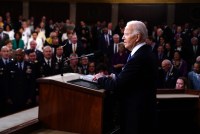Latest Morning Briefing Stories
Sitios de telesalud prometen una cura para la “menopausia masculina” a pesar de prohibiciones
En anuncios de Google, Facebook y otros medios, los sitios web de telemedicina sobre testosterona pueden prometer una solución rápida para la “lentitud” y la libido baja en los hombres. Pero los médicos dicen que no hay pruebas de su eficacia.
A Battle Between Drugmakers and Insurers Hits Patients in the Wallet
There’s a long-running battle between insurers and drugmakers over financial assistance programs that purport to help patients afford expensive drugs. And lately, insurers have been losing ground as lawmakers, regulators and courts weigh in. The issue is whether coupons and other copay aid many patients get from drugmakers should count toward annual insurance deductibles and […]
Georgia’s Medicaid Work Requirements Costing Taxpayers Millions Despite Low Enrollment
Republican Gov. Brian Kemp’s Georgia Pathways to Coverage program has seen anemic enrollment while chalking up millions in start-up costs — largely in technology and consulting fees. Critics say the money’s being wasted on a costly and ineffective alternative to Obamacare’s Medicaid expansion.
Under Fire for Massive Health System Hack, Biden Team Leans on Insurers
The Biden administration has hit on a strategy to deal with the massive, industry-paralyzing cyberattack on a UnitedHealth Group unit: pressuring insurers to fix it. Federal officials have been in constant conversation with senior leaders at UnitedHealth and across the industry, including at a Monday meeting where Department of Health and Human Services and White […]
Cuando tu cobertura de salud dentro de la red… simplemente se esfuma
los contratos de las aseguradoras con médicos, hospitales y farmacéuticas (o sus intermediarios, los llamados administradores de beneficios farmacéuticos) pueden cambiar abruptamente de la noche a la mañana.
Covid and Medicare Payments Spark Remote Patient Monitoring Boom
Demand for help monitoring patients’ vital signs remotely has taken off since a Medicare change in 2019. Dozens of companies now push the service to help overburdened primary care doctors — and as a revenue stream. But some policy experts say its growth has outpaced oversight and evidence of effectiveness.
When Copay Assistance Backfires on Patients
Drugmakers offer copay assistance programs to patients, but insurers are tapping into those funds, not counting the amounts toward patient deductibles. That leads to unexpected charges. But the practice is under growing scrutiny.
How Your In-Network Health Coverage Can Vanish Before You Know It
One of the most unfair aspects of medical insurance is this: Patients can change insurance only during end-of-year enrollment periods or at the time of “qualifying life events.” But insurers’ contracts with doctors, hospitals, and pharmaceutical companies can change abruptly at any time.
What the Health? From KFF Health News: Maybe It’s a Health Care Election After All
Health care wasn’t expected to be a major theme for this year’s elections. But as President Joe Biden and former President Donald Trump secured their respective party nominations this week, the future of both Medicare and the Affordable Care Act appears to be up for debate. Meanwhile, the cyberattack of the UnitedHealth Group subsidiary Change Healthcare continues to do damage to the companies’ finances with no quick end in sight. Margot Sanger-Katz of The New York Times, Anna Edney of Bloomberg News, and Joanne Kenen of Johns Hopkins University and Politico Magazine join KFF Health News’ Julie Rovner to discuss these issues and more. Also this week, Rovner interviews Kelly Henning of Bloomberg Philanthropies about a new, four-part documentary series on the history of public health, “The Invisible Shield.” Plus, for “extra credit” the panelists suggest health policy stories they read this week that they think you should read, too.
A New $16,000 Postpartum Depression Drug Is Here. How Will Insurers Handle It?
A pill form of an effective drug for postpartum depression hit the market in December, but most insurers do not yet have a policy on when or whether they will pay for it. The hurdles to obtain its predecessor medication have advocates worried.
An Arm and a Leg: The Medicare Episode
On this episode of “An Arm and a Leg,” host Dan Weissmann breaks down the complicated and expensive world of Medicare with practical tips to pick the right plan and avoid penalties.
Biden Said State of the Union Is Strong and Made Clear His Campaign Is Off and Running
President Joe Biden used his roughly 68-minute address to Congress to counter lackluster public approval ratings and draw clear contrasts between his administration’s policies and those of Donald Trump and some congressional Republicans. Abortion and health care were in the spotlight.
Biden Team, UnitedHealth Struggle to Restore Paralyzed Billing Systems After Cyberattack
The cyberattack on a unit of UnitedHealth Group’s Optum division is the worst on the health care industry in U.S. history, hospitals say. Providers struggling to get paid for care say the response by the insurer and the Biden administration has been inadequate.
What the Health? From KFF Health News: The State of the Union Is … Busy
At last, Congress is getting half of its annual spending bills across the finish line, albeit five months after the start of the fiscal year. Meanwhile, President Joe Biden delivers his annual State of the Union address, an over-the-counter birth control pill is (finally) available, and controversy erupts over new public health guidelines for covid-19 isolation. Alice Miranda Ollstein of Politico, Sarah Karlin-Smith of the Pink Sheet, and Sandhya Raman of CQ Roll Call join KFF Health News’ Julie Rovner to discuss these issues and more. Also this week, Rovner interviews Neera Tanden, the White House domestic policy adviser, about Biden’s health agenda. Plus, for “extra credit,” the panelists suggest health policy stories they read this week that they think you should read, too.
Whistleblower Accuses Aledade, Largest US Independent Primary Care Network, of Medicare Fraud
A recently unsealed lawsuit alleges Aledade Inc. developed billing software that boosted revenues by making patients appear sicker than they were.
Journalists Examine Medicaid Unwinding, Farmworkers’ Mental Health, and the Big Opioid Payback
KFF Health News and California Healthline staff made the rounds on national and local media this week to discuss their stories. Here’s a collection of their appearances.
Readers Call on Congress to Bolster Medicare and Fix Loopholes in Health Policy
KFF Health News gives readers a chance to comment on a recent batch of stories.
Hacking at UnitedHealth Unit Cripples a Swath of the US Health System: What to Know
Change Healthcare, a firm recently bought by insurance giant UnitedHealth Group, reportedly suffered a cyberattack. The company processes 14 billion transactions annually, including payments and requests for insurance authorizations.
Si eres pobre, un tratamiento de fertilidad suele ser un sueño inaccesible
Pero las personas con ingresos más bajos, a menudo de minorías, tienen más probabilidades de estar cubiertas por Medicaid o por seguros limitados que no tienen esta cobertura.
Say That Again: Using Hearing Aids Can Be Frustrating for Older Adults, but Necessary
Hearing loss is more than a nuisance. It also raises the risk of cognitive decline, dementia, falls, depression, and social isolation.























